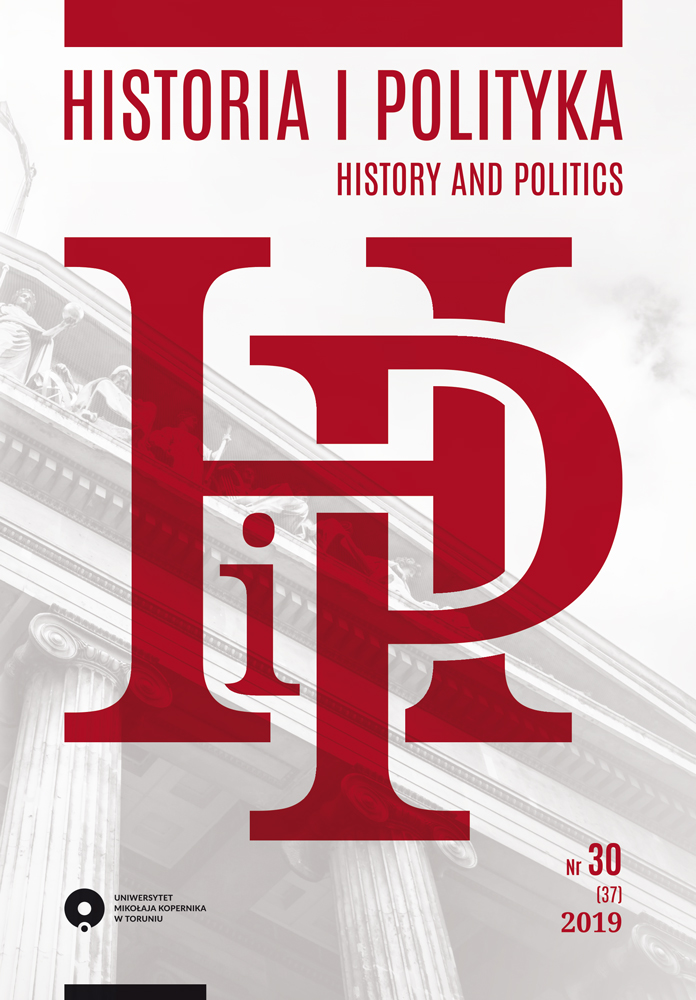Long-Term Trends in Conventional Political Participation in the Federal Republic of Germany
DOI:
https://doi.org/10.12775/HiP.2019.034Słowa kluczowe
political participation, conventional actions, participation trends, Federal Republic of GermanyAbstrakt
The purpose of this study was to identify long-term trends in conventional participation in the Federal Republic of Germany. The time frame for the analysis covered the period between 1946 and 2016. Conventional participation was measured against two variables using regression analysis: the level of participation in elections and the level of membership in political parties. For both variables, statistically significant development trends were identified, which were mainly of a declining nature. The data employed concerned voter turnout in elections to the Bundestag and Landtags, and the development process of membership levels in six major political parties: CDU, SPD, CSU, FDP, Alliance 90/The Greens, and the Left/PDS.Bibliografia
Arzheimer, K. (2002). Politikverdrossenheit. Bedeutung, Verwendung und empirische Relevanz eines politikwissenschaftlichen Begriffes. Wiesbaden: VS Verlag für Sozialwissenschaften. DOI: https://doi.org/10.1007/978-3-322-97103-6.
Barnes, S.H., & Kaase, M. (1979) (eds.). Political Action: Mass Participation in Five Western Democracies. Beverly Hills: Sage Publications.
Bee, C., & Kaya, A. (2017). Conventional Versus Non-Conventional Political Participation in Turkey: Dimensions, Means, and Consequences. Turkish Studies, 18(1), 1–9. DOI: https://doi.org/10.1080/14683849.2016.1272049.
Blais, A. (2010). Frekwencja wyborcza. In: R.J. Dalton, & H.D. Klingemann (eds.), Zachowania polityczne. Vol. 2 (pp. 237–256). Warszawa: Wydawnictwo Naukowe PWN.
Conway, M.M. (2000). Political Participation in the United States. Washington, D.C.: CQ Press.
Cześnik, M. (2007). Partycypacja wyborcza w Polsce. Perspektywa porównawcza. Warszawa: Wydawnictwo Naukowe Scholar.
Dalton, R.J. (1988). Citizen Politics in Western Democracies: Public Opinion and Political Parties in the United States, Great Britain, West Germany, and France. Chatham, N.J.: Chatham House Publishers.
Dalton, R.J., & Klingemann, H.D. (2010). Obywatele a zachowania polityczne. In: R.J. Dalton, & H.D. Klingemann (eds.), Zachowania polityczne. Vol. 1 (pp. 33–62). Warszawa: Wydawnictwo Naukowe PWN.
Di Palma, G. (1970). Apathy and Participation: Mass Politics in Western Societies. New York: The Free Press.
Eilfort, M. (2006). Wahlenthaltung: Ein vielschichtiges Phänomen mit wachsender politischer Bedeutung. In: B. Hoecker (ed.), Politische Partizipation zwischen Konvention und Protest. Eine studienorientierte Einführung (pp. 55–73). Opladen: Verlag Barbara Budrich.
Gabriel, O.W. (1997). Politische Einstellungen und politisches Verhalten. In: O.W. Gabriel, & E. Holtmann (eds.), Handbuch Politisches System der Bundesrepublik Deutschland (pp. 381–497). München–Wien: R. Oldenbourg.
Garlicki, J. (2005). Demokracja i integracja europejska. Studium osobistych i politycznych orientacji dwóch pokoleń Polaków. Toruń: Wydawnictwo Adam Marszałek.
Marsh, A. (1990). Political Action in Europe and the USA. Basingstoke: MacMillan.
Mider, D. (2008). Partycypacja polityczna w Internecie. Studium politologiczne. Warszawa: Dom Wydawniczy Elipsa.
Niedermayer, O. (2017). Parteimitglieder in Deutschland: Version 2017 NEU. Arbeitshefte aus dem OSZ, 27, 1–82. Retrieved from: https://www.polsoz.fu-berlin.de/polwiss/forschung/systeme/empsoz/team/ehemalige/Publikationen/schriften/Arbeitshefte/P-PMIT17-NEU.pdf.
Rucht, D. (2010). Engagement im Wandel: Politische Partizipation in Deutschland. WZBrief Zivilengagement 01. Berlin: Wissenschaftszentrum Berlin für Sozialforschung (WZB). Retrieved from: https://www.econstor.eu/bitstream/10419/60046/1/631896406.pdf.
Rudzio, W. (2015). Das politische System der Bundesrepublik Deutschland. Wiesbaden: VS Verlag für Sozialwissenschaften. DOI: https://doi.org/10.1007/978-3-658-06231-6.
Schäfer, A. (2009). Alles halb so schlimm? Warum eine sinkende Wahlbeteiligung der Demokratie schadet. Köln: Max Planck-Institut für Gesellschaftsforschung. Retrieved from: http://www.mpifg.de/aktuelles/themen/doks/jahrbuch-09-10-schaefer-280509.pdf.
Steinbrecher, M. (2009). Politische Partizipation in Deutschland. Baden-Baden: Nomos Verlagsgesellschaft.
Strømsnes, K. (2009). Political Consumerism: A Substitute for or Supplement to Conventional Political Participation? Journal of Civil Society, 5(3), 303–314. DOI: https://doi.org/10.1080/17448680903351834.
Van Deth, J.W. (2014). A Conceptual Map of Political Participation. Acta Politica, 49(3), 349–367. DOI: https://doi.org/10.1057/ap.2014.6.
Von Alemann, U., Erbentraut, P., & Walther, J. (2010). Das Parteiensystem der Bundesrepublik Deutschland. Wiesbaden: VS Verlag für Sozialwissenschaften. DOI: https://doi.org/10.1007/978-3-658-21159-2.
Pobrania
Opublikowane
Jak cytować
Numer
Dział
Licencja
Uniwersytet Mikołaja Kopernika w Toruniu respektuje prawo do prywatności i ochrony danych osobowych autorów.
Dane autorów nie są wykorzystywane w celach handlowych i marketingowych. Redaktorzy i recenzenci są zobowiązani do zachowania w poufności wszelkich informacji związanych ze złożonymi do redakcji tekstami.
Autor, zgłaszając swój tekst wyraża zgodę na wszystkie warunki i zapisy umowy licencyjnej (określającej prawa autorskie) z Uniwersytetem Mikołaja Kopernika w Toruniu.
Statystyki
Liczba wyświetleń i pobrań: 609
Liczba cytowań: 0



